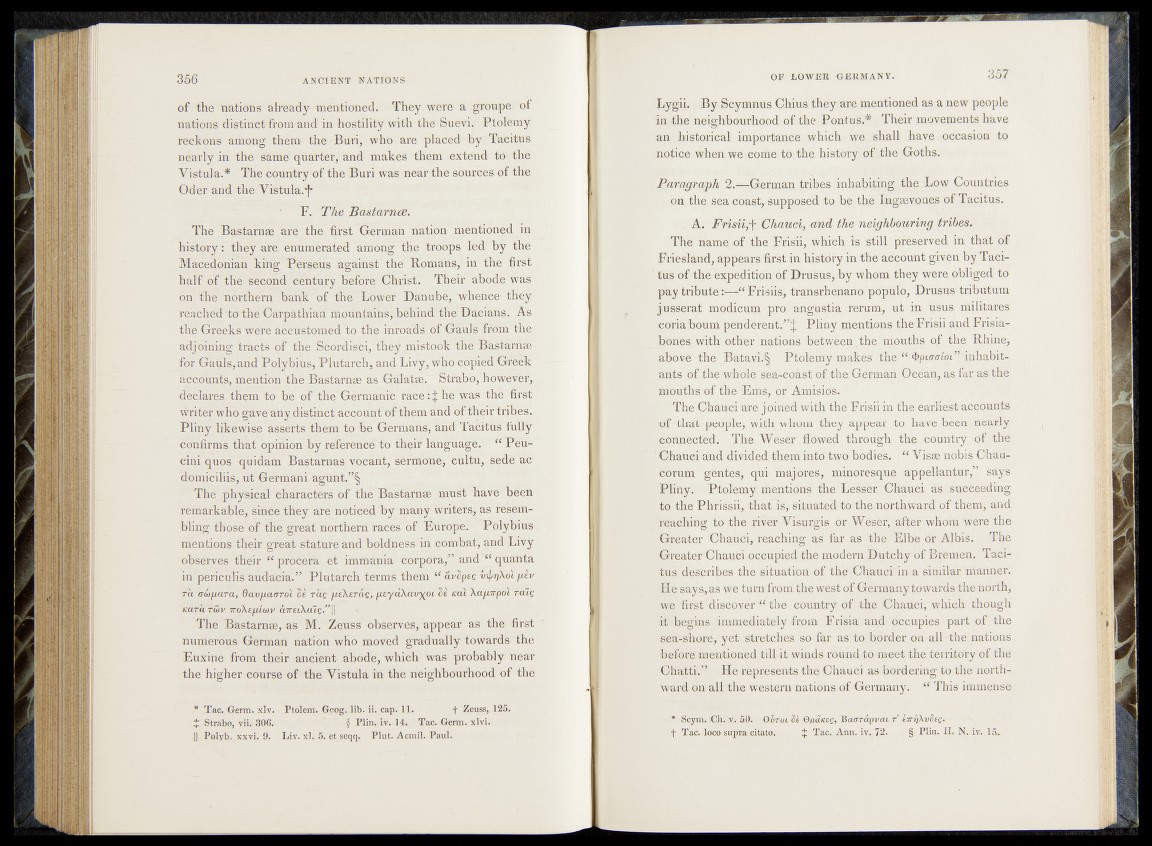
of the nations already mentioned. They were a grouped of
nations distinct from and' in hostility with theSuevi. Ptolemy
reckons among them the Buri, who are placed by Tacitus
nearly in the tame quarter, and makes them extend to the
Vistula.* The country of the Buri was near the sources of the
Oder and the Vistula.-}-
* F. The Bastarnae.
The Bastarnae are the first German nation mentioned in
history: they are. enumerated among the troops dëd by the
Macedonian king Perseus against the Romans, in the first
half of. thé second century before "Christ?*'y Their abode was
o h fh e 1 northern bank of the bower Danube, whehée’TKêy
reachecbterthe Carpathian mountains, behind therDacianfs. ^As
the Greeks were accustomeePto the inroads’ Of Gaiils from the :
adjoining tracts of the Scordisci, they mistook the BastaYnse-
Jfor Gauls, and Polybius, Plutarch, and Livy, w hö'cöpiwGreek
accounts, mention the IJastarine as Gala tie. Strabö, however,
declares them to be of the^Germanic ra’ceij; he was* Me %rst
writer who gave any distinct account of them and of their tribes.
Pithy likewise assertsdhem tqjbe Germans, and TacittÉNrolly
confirms that opinion by reference to their language'.- “ Peu-
cini quos quidam Bastarnas vocant, sermone, cultujhsèdb aè’
dcÊfiïeilijs, ut Germani agunt.”§
The physical ehaiactèrs of the Bastarnae mustkHave be'eh
remarkable, since they are noticed by many writers^aS resembling
those oF the great northern races of Europe. POlybiuS
mentions their great stature and boldness in combat, and Livy
observes their u procera et immania corpora,” ana “ quanta
in periculis audacia.” Plutarch terms them “ avtipee ifyftjXól pev
rit autfiara, fSavuaorol dè roc pteXerae, fieya.Xav\oc de mi Xapifpot falg
KaruTwv TroKefUMv d x e j \ a ï c . ” | | -<
The Bastarnae, as M. Zeuss observes, appear as the first
numerous German nation who moved gradually towards the
Euxipe from their ancient abode, which was probably near
the higher course of the Vistula in the neighbourhood o f the
• .Tac. Genoa, xlv. Ptolenl. Geog. lib. ii. cap. 11. f Zeuss, 125.
X Strabo, vii. 306. Plin. iv. 14. Tac. Germ. xlvi.
j| Polyb. xxvi. 9. . Liv. xl. 5. et seqq. Plut. Aemil. Paul.
bygii. ByJkymnus Chius they are mentioned as a new people
in the neighbourhood of the P.optus.* Their movements have
an histo^alrlmportaice whîiÉiïWé ih a ll have occasion to
-notice when we come to the hi story , of the Goths. •
Paragraph 2.—German trjb£S, inhabiting the. Low Countries
on the sea coast,, supposed ty. be the Iagsevqnes of Tacitus.
. A. FHsii,-f* Chdueh, and the neighbouring tribes.
The name of the Frisri,/which'Ts:||till preserved in that of
Friesland, appears first in hi^tdry in th'eaccount given by Tacitus
oPtbe expedition;^ Drusus, by whom they were obliged to
pay tributej'V^-^ Frisiis, trarisrhenahq populo, Drusus tributum
ju^serat modihn^' prp rangLustia renrm, u,t - in USuSf mi litares
^fe/oria boum pendirent,” J Pliny mentions îtjxè’FTjsii and Frisian
_bones with other nationsilpetween. .the ‘BpjOnths ed the Rhine,
■, above' the Batavi.’^^P'tolJèîïiÿmànS^the^^^pWCTtîîF’âhhabit-'
ants of the wholb^eaiÇoâtf of the German Ocean, ;âS far as thê
mouths pf -the:E ms|; 5r Amro's; *
i|.\The\Chahci aie’joined with the Frisii in the*earliest aecojints
of that people, with whom they appeart|pr- have|^^nfneàTplÿ
lêpnnected. The V^feSerFfidwed^ through thp ;^^miitj:y|of the
* Ohauci and divided them into two b o d j ^ fu ?Visse nobis Chau-
feorum gentes, qui" majorés, "jninores/pijLg tappellantur,’^ ;¥ a ^
Plmÿ;/' Ptolemy mentions tfjie Lesser Chauci as ''succeeding
to the Phris^ii, that is, situated to the northward of them, and
reaching to the river Visurgis or WesèK after wham were th e
Greater Chauci, reaching as far as -the Elbpjor 'Albis. The
Greater’ Ohauci occupied the mbdern. Dutchy bf Bremen. Tacitus
describes the situation of tlieGhafiei in a similar manner.
He says, as we turn from the west of Germany towards thenorth,
we first'“discover •“ thévCoüntry of th e ‘Ohauci, which though
it begins immediately .from Frisia and occupies part of the
sea-shore, yet stretches so far as to*bordier:on all the nations
before mentioned till it winds round to mefet* the territory of the
Glfatti.” He represents th%Ghauci as bordering to the northward
on all the western n&ttdhs o f Germany. “ This immense
> * Seym. iChu.v. 50. Oiwai'^è Qpatceç, BacrmSjpvaBr sTrrikvSeç.
■j- Tac. loco supra citato. , $ Tac., Ahn. iv. 72. Plin. H. N, iv. 15..